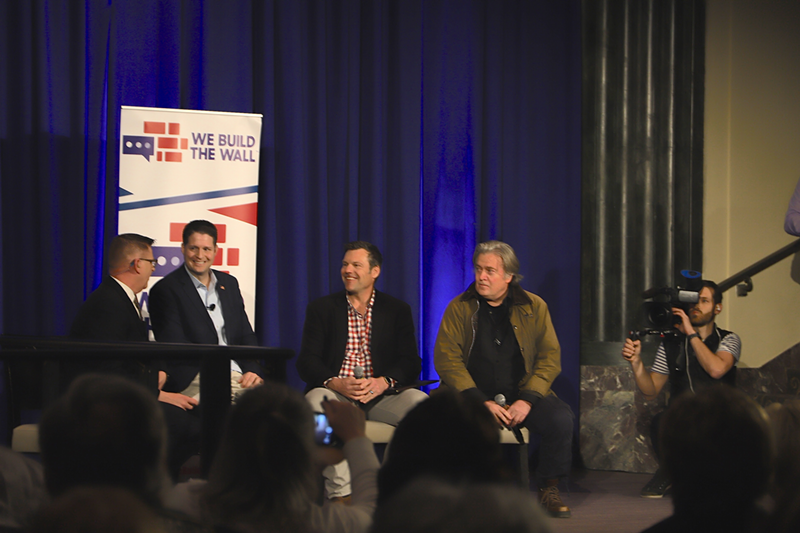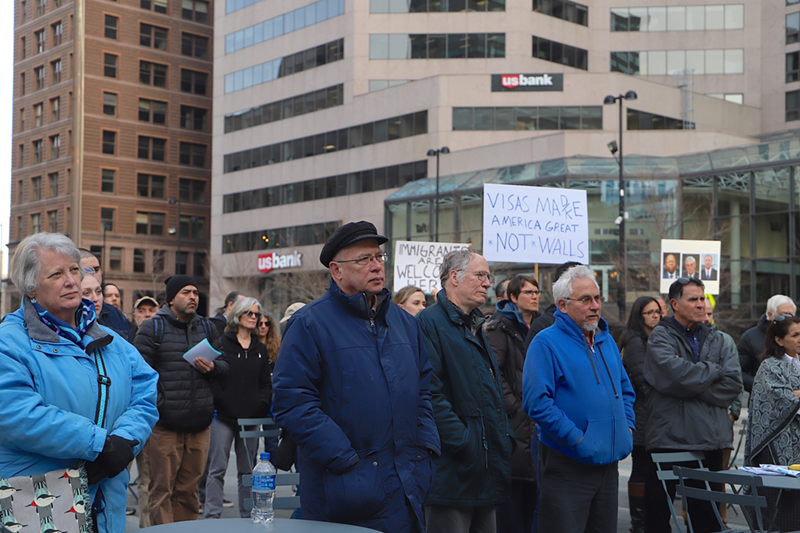
About 200 people gathered in the Hilton Netherland Plaza's opulent Hall of Mirrors last night to hear a rather unique pitch: Give money to a private nonprofit called We Build the Wall so that group can construct a barrier between the United States and Mexico on privately-owned land.
The idea is the brainchild of Brian Kolfage, who says he tired of congressional inaction on President Donald Trump's push for the barrier with Mexico. He launched the idea in December via crowdfunding site GoFundMe. After raising $20 million from Trump supporters, the site refunded the money because Kolfage changed the recipient from the federal government to his nonprofit, he says because the government isn't set up to take the donations.
"Just like that, I created it," Kolfage said last night about the effort's quick rise. "I sent it out to the media and it just blew up."
Kolfage told the crowd — mostly older, male and white — that he thinks his contractors can build the wall on private land for $1 billion — much less than the $5.6 billion Trump requested. He told attendees the group will break ground on the barrier next month.
Supporters cheered Kolfage and others connected to his nonprofit, breaking out into chants of "Build the Wall" and loudly booing Democrats, liberals and congressional Republicans who failed to pass wall funding. Though about half the seats in the hall were empty, the gathering was raucous.
Walt Davis, a farmer from Lebanon, was interested in an offer that would allow him to sponsor steel beams for the wall.
"I want about 14 of those for my family," he said. Organizers say they're still figuring out if they'll offer such sponsorships.
Attendees — many from surrounding suburbs, but some from neighboring states — didn't just come for the sales pitch, of course. They came to bask in the glow of several figures who have been close satellites to President Donald Trump, or who have carved out a niche for themselves in the growing corner of the conservative world very concerned about undocumented immigration and drug smuggling at the U.S. border.
Very, very concerned.
Milwaukee County Sheriff David Clarke, a cowboy-hatted Trump acolyte, pitched the situation at the border in near-armageddon terms, describing a constant flow of drugs and humans coming into the United States he says he has seen on trips to Texas.
"Congress is lying if they say there is no crisis," he said, voice rising. "There is a crisis. I saw it. I was there."
Breitbart editor Brandon Darby, whom the group calls a border expert, also spoke. He explained that many communities along the border don't support the wall because they are made up of "Democrats and immigrants," but that that fact shouldn't deter supporters.
"We can't allow those communities to tell us we can't secure ourselves," he said.
Of course, the main event was former Trump chief strategist Steve Bannon, who in many ways was the architect of the immigration platform that became a linchpin of Trump's 2016 campaign.
Bannon, who is on the We Build the Wall board of directors. didn't disappoint supporters in the Hall of Mirrors, saying he wasn't there to disparage immigrants before calling Mexico a "failed narco state" that was in "complete anarchy" and asserting that he was "in Cincinnati, very simply, because the border crisis is in Ohio and in Michigan. It's not just in McAllen, Texas."
The event also featured members of three "angel families," or families who say they have had members murdered by undocumented immigrants. Those included Steve Ronnebeck, whose 21-year-old son was shot during a 2015 convenience store robbery in Mesa, Arizona.
The crowd cheered statements from the speakers. But facts from agencies charged with protecting the U.S. border tell a much more nuanced story.
It is unclear what a border wall would do to stop the flow of drugs into the United States highlighted by Bannon, Clarke and others. The U.S. Department of Homeland Security reported that in 2018, 90 percent of heroin and 80 percent of fentanyl that came into the U.S. came through legal checkpoints, not via places where a wall would be built.
Border apprehensions have ticked up over the past year, reaching 465,000 in 2018 and on pace to go higher this year. That's the most since 2014, but is still far fewer than in the 1980s and 1990s, when it was not uncommon for apprehensions to reach more than a million a year.
Most of those apprehensions are of families seeking asylum from political and gang violence in Central America — something that is legal under international law.
A "large share of recent apprehensions are UACs (unaccompanied minors) and asylum seekers who are routinely apprehended,” DHS officials wrote in a 2017 report.
We Build the Wall's leaders have an answer for that — they say many of those coming to the border are "abusing" asylum laws and are just here for jobs. But that assertion belies the violent situations in countries like Guatemala, El Salvador, Honduras and elsewhere that migrants are fleeing.
Others disagree strongly with Bannon, Kolfage and their supporters.
A group of about 50 organized by local group Cincinnati Compass gathered at Fountain Square to push back against calls for a wall, highlighting the economic and cultural contributions immigrants make.
"We want to overcome the bigotry that still exists in these United States and present facts about what is actually happening on the southern border and facts about the contributions being made by immigrants in our community here in Greater Cincinnati," Compass CEO Steve Driehaus said. "Cincinnati was built by immigrants. And in Greater Cincinnati, immigrants generate $3.2 billion in household income and pay $272 million in state and local taxes… yet we have people wanting to turn those immigrant families away."
After the Fountain Square event, a few dozen protesters stood across the street from the Hilton holding a banner painted like a wall with "Bridges Not Walls" written on it in Spanish.
"I think it's clear that this is a sad effort on the part of people who want to stay in the news on an issue that most people realize is fake," said organizer Nancy Sullivan, who runs a nonprofit dedicated to helping immigrants called Transformations CDC. "There is no emergency at the border. This is a ridiculous effort."


